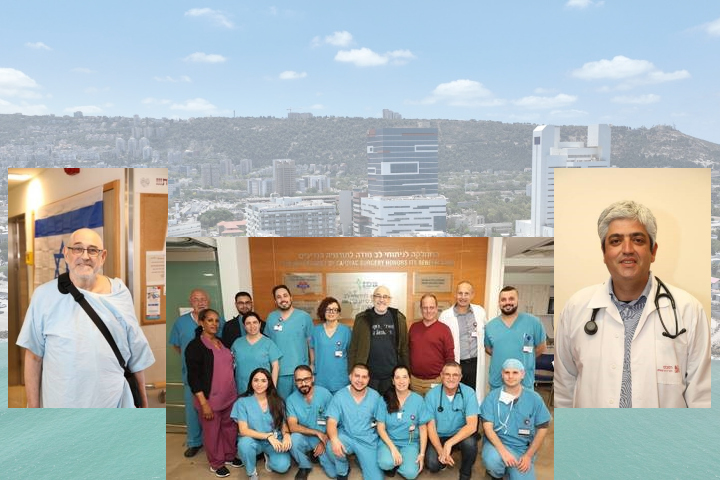Menashe Eisner, 63, is a lucky man. After a heart attack and multi-system failure, his heart stopped and he “died.” Thanks to an advanced life-saving intervention at Rambam Health Care Campus (Rambam) in Haifa, Israel, Eisner was miraculously discharged home 40 days later.
 L) Menashe Eisner after the LAD procedure. MIddle) The medical team that cared for Menashe Eisner. R) Dr. Oren Caspi. See text for details. Photography: Rambam HCC
L) Menashe Eisner after the LAD procedure. MIddle) The medical team that cared for Menashe Eisner. R) Dr. Oren Caspi. See text for details. Photography: Rambam HCC
Not long ago, while relaxing at his home in a small town just north of Haifa, Eisner suffered a heart attack and multi-system complications. After being rushed by ambulance to Bnei Zion hospital in Haifa, he underwent a cardiac catheterization. However, the hospital was not equipped to handle a complicated case like his. Eisner’s physicians decided to transfer him to Rambam where the advanced life-saving treatment he needed was available.
“The patient arrived with multi-system failure and heart, pulmonary, and kidney damage,” explains Dr. Oren Caspi, director of Rambam’s Heart Failure Unit, “We performed a complex bypass surgery, but in the end, his heart stopped working again. We had to place Eisner on an ECMO machine, an advanced medical device that artificially activates the patient’s heart and lungs.”
Although Eisner improved, his heart did not recover as expected. “He was suffering from serious heart failure and it was clear he would not survive much longer,” explains Professor Benjamin Medalion, an attending physician in Rambam’s Department of Cardiac Surgery, “We decided that a highly-specialized surgical intervention would give him the best chance of survival.”
In a very unusual move, the medical team decided to wake Eisner from his sedated and ventilated state to obtain his consent for the life-saving procedure. It would involve implanting a left ventricular assist device (LVAD) to support Eisner’s damaged heart and improve the blood flow from his left ventricle to the rest of his body.
A highly trained multidisciplinary team performed the minimally invasive but lengthy procedure with Eisner still connected to the life-support systems. “Implanting a LVAD is lengthy and complex. We had exhausted all other treatment options,” says Dr. Caspi. “Thankfully, against all odds, Eisner recovered, and miraculously, 40 days later, he was discharged home.”
According to Eisner, the man who entered the hospital was not the same one who came out. “They say I’m a medical miracle,” he says with a smile, “I was in a terrible place. I don’t remember much, but I’m grateful to everyone who cared for me and helped me recover. I recommend everyone to take care of yourselves and give yourself the best chance for a long and good life.”
Details of middle panel in featured pictured: Menashe Eisner (center) with the team that cared for him, together with Professor Medalion (to Eisner’s right), and Professor Gil Bolotin, director of the Department of Cardiac Surgery at Rambam.

